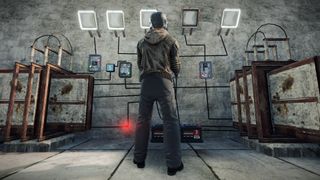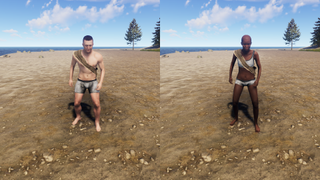Rust finally gives its naked citizens underwear, electricity
In five years Rust has sold over seven million copies and netted Facepunch over $100 million.

It's been five years since Rust arrived, treating players to dangling dongs, rampaging bears, and a ruthless multiplayer survival experience. To celebrate this anniversary, a big, world-altering update is now live. Electricity has been added to the mix of tree-chopping, rock-breaking, gun-crafting, base-building, and (recently) hot-air ballooning. Also, you can now wear underpants.
The Electric Anniversary, as it's called, is now live and contains a number of electrical components: batteries, switches, pressure pads, splitters, timers, and other various odds-and-ends that will allow players to use electricity to power lights, automation, clocks, CPUs, defenses, traps, and god knows what else. Power generation is currently (ha ha, current) supplied by solar panels and windmills. Here's a nice video from Rustafied to introduce you to the basics.
Along with the exciting new electrical components, the update adds an M39 rifle, provides an overhaul to how bows work, brings some improvements to the cargo ships, and as I said earlier, adds underwear. This last item (called a censorship option in the devlog) should be helpful for streamers who are penalized for showing bare butts, wangs, boobs, and muffs while playing the game for others.

Finally, in a post on Facepunch, Garry Newman delivered some stats about Rust's development. In five years, Rust has sold 7,457,075 copies, grossing $110,313,646, which includes bundles, DLC, and in-game sales. Its highest concurrent player count was 71,801, just this past month following the balloon update. It's also sold over 4 million skins, and the creators of those skins have earned nearly $2 million combined from those sales. That's some shockingly (electricity, get it?) good news.
The biggest gaming news, reviews and hardware deals
Keep up to date with the most important stories and the best deals, as picked by the PC Gamer team.

Chris started playing PC games in the 1980s, started writing about them in the early 2000s, and (finally) started getting paid to write about them in the late 2000s. Following a few years as a regular freelancer, PC Gamer hired him in 2014, probably so he'd stop emailing them asking for more work. Chris has a love-hate relationship with survival games and an unhealthy fascination with the inner lives of NPCs. He's also a fan of offbeat simulation games, mods, and ignoring storylines in RPGs so he can make up his own.
Most Popular






